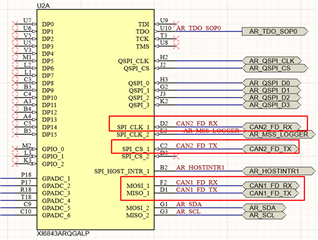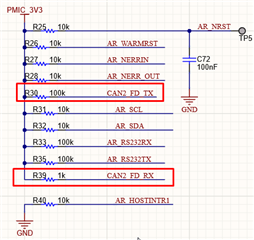Other Parts Discussed in Thread: , MMWAVEICBOOST
Hello Team,
I am preparing a design in which I use 2 CAN-FD lines using AWR6843AOP. In the design, I want to use one of the CAN bus to read CAN data. I want to use the other CAN bus to write data to a LIN line.
I created the CAN transceiver (TCAN1042HGVDRBRQ1) connection with AWR6843AOP. I gave the CANH and CANL pins of 2 transceivers out of the board via a connector.
Can I use one of the CANH and CANL lines as a LIN line? What do I need for this? Is it enough to connect a CAN to LIN converter to the CAN output (if such a solution is possible)? Do you have a suitable solution, product or design?
I'm a little new to this. Thanks in advance for your suggestions.



